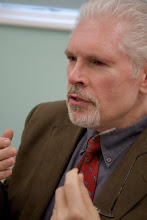I may have entered War Horse a bit too cynical for a near three-hour play about a mechanical horse. I found myself skeptical, worried even of not being able to absorb this play. Would I be left unsatisfied? Would I be brought to tears? Would I be more worried about how long the line would be in the ladies’ room during intermission?
Perhaps I expected too much, because I was instead met with a show of beauty and genius that far exceeded any worries I had beforehand. I was more captivated than I could have asked for. It wasn’t fifteen minutes into the play that I no longer noticed the three actors operating Joey the Horse. It wasn’t a play anymore; it was a chunk of life, as we watched it in action. As far as theatre goes – and as far as we, the audience, were concerned– that is the most important achievement: to make us forget we were watching a play.
War Horse tells the story of Albert, a sensible yet volatile adolescent who becomes – albeit not of his own volition – the new owner of a colt. Though he fears another heavy burden on his already-suffering family, Albert becomes quite fond of the horse, and names him Joey. This fondness progresses into a loving friendship, and along with it, a strong loyalty for one another. As World War II is declared, Joey is sold into the battlefield. Albert, devastated and worried for Joey’s safety, joins the army despite his underage status in search of his best friend.
The set of the play was terrific. While I was delighted with the horse operators and realistic booming of sounds, I was highly impressed with the lighting and how the play used light to emphasize action. One memorable scene was the death of Major Nichols, the soldier who rode Joey through battle. As he fell off the horse, lights flashed on and off as Nichols fell to the ground. In reality, other actors assisted the actor playing Nichols by lifting him from the horse by his feet and slowly laying him on the ground. The flashing lights portrayed a slow motion setting, further emphasizing the significance of Nichols’ death. Soon after, Joey becomes lost and alone in No Man’s Land. We also lose one of the few characters sympathetic to Albert’s loss.
The themes running through the play’s duration were what truly drew me in. It is a story of everlasting companionship and loyalty, set against the backdrop of a devastating war. Yet despite the violence and shock of battle, the two themes represent a lasting comfort throughout the play. We are forced to see the bloodshed, yes. But I felt a sense of relief while watching the show, even at its bloodiest. The love between Albert and Joey is what keeps our hopes and heads above water. Soon, it becomes our only light through a world of darkness.
I was also impressed with the play’s display of war. Beside the Albert/Joey storyline is a group of soldiers who are naïve to the realities of war. Here we are watching young men who expect glory and gold with joining the war, and are instead thrust upon a reality of bloodshed, destruction, and mortality. This rude awakening visibly shakes the soldiers, and their emotions are palpable. We can feel their fear.
This showering of praise shouldn’t suggest that War Horse didn’t have its flaws. I wasn’t very impressed with Matthew Aubrey, the young actor playing Albert. While his performance is great, I never felt an emotional connection to his character. I felt myself becoming attached to other characters in the play, despite Albert’s status as a main character. I found myself more intrigued by the supporting stories than whether or not Albert was all right. His performance grew stronger near the end of the play, hence my satisfaction by the time the show ended. But as I watched Aubrey in the first act, I never felt close to the character, nor did I feel drawn in by his acting. I just knew that I was watching an actor in a play.
Despite the flaw, War Horse was a tremendous play, one that I would highly recommend to anyone. It is an experience that will make you appreciate the friends you have and the time you live in. I didn’t realize how much the play affected me until I began leaving the theater. I realized how much I could actually relate to Joey: a young being away from home, in a foreign place with friends and family worried about my safety. It was a melancholy but peaceful epiphany. For I was aware of two things: that I was loved, and that those who loved me were awaiting my return.
- Mel Tayo

A very intelligent and well-written review and a good analysis of what you did not like about the show. You make valid and precise comments about the principal character and do so in an objective, unemotive way. This is excellent. Just what I'd hoped to read. Dr Q
ReplyDelete